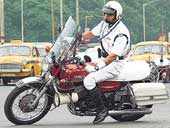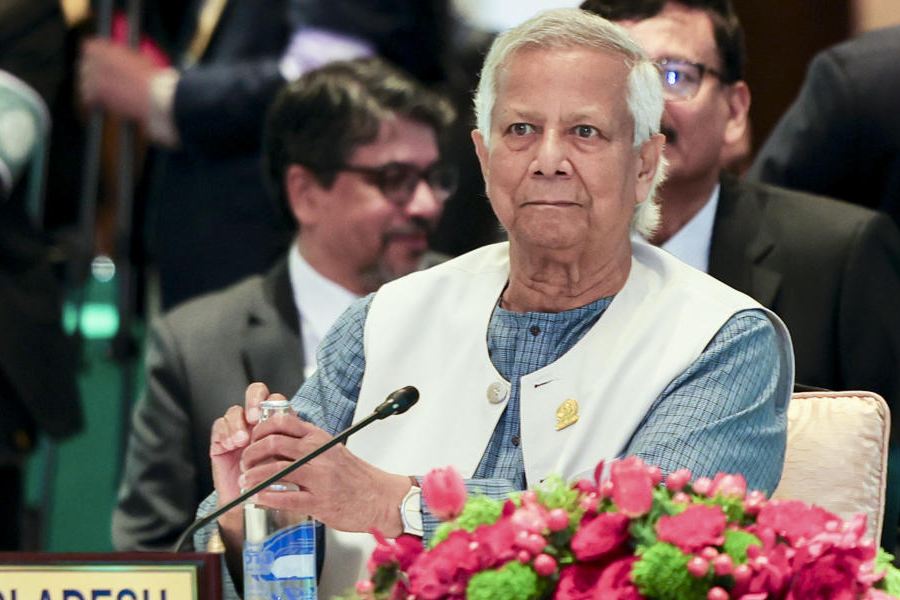 |
| Man and the machine: Prosenjit Chatterjee on his motorcycle. Picture by Sanjoy Chattopadhyaya; |
 |
| Nighat Said Khan at the Rotary meet. Picture by Aranya Sen |
 |
| A couple at the La Martiniere for Boys reunion. Picture by Sanjoy Chattopadhyaya |
Prosenjit Chatterjee, namesake of Tollywood’s top hero, is a proud man. A pilot with the Governor, the Calcutta police officer rides a Yamaha 350, which is one of the only two such bikes remaining with the Calcutta police. The production of the model, which was manufactured here with Rajdoot, has stopped and its spare parts are not available. But Chatterjee takes excellent care of it, searching high and low for the parts when repair is needed. His department encourages him. It is rewarding. It is not unusual for a pedestrian to stop and extol the virtues of the 30.5 BHP bike to his young son. Chatterjee also says that cool dudes on two-wheelers who would otherwise treat Calcutta roads as racing tracks start to behave well when they see the bike on their trail. They know it will catch up. It can speed up to 150 km per hour, Chatterjee assures.
Mush and Coca-Cola
This is the season for visitors to the city from the other side of Wagah border. Barely a week after three admirable ladies from Pakistan, one of them the head of Oxford University Press in her country, left an impact on the city, Nighat Said Khan, a well-known Pakistani activist and social scientist, dropped in for a whistle-stop tour. Invited by the Pakistan-India People’s Forum for Peace and Democracy in association with the Rotary Club (Chowringhee), to speak on “The Current Situation in Pakistan and the Prospect of Peace”, Khan quickly set about correcting perceived notions of Pakistan as being only about “burqa… bomb… military” and spoke of her people as dynamic, creative and deeply involved in the process of peace.
As academics and the intellectual elite settled in the creaking seats of the dilapidating auditorium at Rotary Sadan, it was a pleasant surprise to hear Khan talk about her country’s current political turmoil with simplicity and wit. Stern and solemn on first appearance, her sense of humour defied exhaustion from a heavy schedule of seminars and giving talks. She also referred to the statement made by Prime Minister Shaukat Aziz: “Musharraf is a brand name. Like Coca-Cola.”
When asked how she reacted to honour killings, she shot back: “How would you react to something like that?” But she was the picture of the famous Pakistani tehzeeb when, after a long and tiring round of fielding questions, she listened patiently to the plight of a group of Bangladeshi refugees living in Malda, promised to read a book written and presented by one among the audience and warmly greeted an old man claiming to have met her years ago in Lahore.
Spirit of old boys
You never thought that this school of schools did not have one, given the power and the reach of its old boys’ networks, but on September 1 hundreds of Martinians came together to launch the Association of La Martiniere Alumni (ALMA), the first formal alumni association of the school.
“A consolidated effort had not been made before this to bring together all the alumni of the schools,” said Sanjoy Mukherjee, batch of 1988 of La Martiniere for Boys.
The association was launched by the Bishop of Calcutta and the programme was telecast live all across the world through their website which was launched on the same day. Their motto: “In spiritu et veritate” (in spirit and truth).
Harsh Neotia, Karan Paul, Vijay Mallya, Leander Paes, Nafisa Ali, Jug Suraiya and Swapan Dasgupta have studied at this school. The association will not only be about networking, but also to give something “back to the alma mater”.
Priorities include upgrading the gymnasium and making it functional, doing up the toilets and rainwater-harvesting. “We also like to use the funds to do something for ex-teachers, students and other staff who are not doing so well financially,” said Mukherjee.
Song on move
In all respects he looks like a taxi driver, but is actually a singing social satirist. For soon after you jump into his cab, the music starts.
The first song is a Bengali Manna Dey classic: “O Lolita…” But as you pay attention, you realise that the words don’t quite sound right. In fact, they go: “O Jyotida, Buddhake aaj chole jete bolna (O Jyoti Basu, please ask Buddhadeb to leave)”.
Then it’s the Suchitra-Uttam number that is every true Bengali’s favourite romantic song: “Ei poth jodi na shesh hoi”. Only the words are: “Ei paap jodi na shesh hoi (If these corrupt times don’t end”.
Next, it’s a Bhojpuri number that talks about how the politician had a bloated belly after having too much “Rabri”. As you reach your destination, he is singing the tune of the Rafi number: “Dil ke jharokhe mein tujhko baitha kar,” set to new words: “Factory ki jagah pe flat banakar…”
He said that the songs were written and set to tune by someone called “Pakka Shaitan”, Pakka was his name and Shaitan his surname, about which he couldn’t do anything. He added that his own name was Opriyo Sotyo (Unpleasant Truth), gave back the exact change and drove off.
(Contributed by Sanjoy Chattopadhyaya, Rohini Chaki and Chandreyee Chatterjee)











